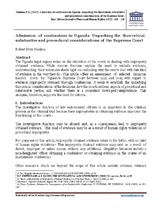| dc.contributor.author | Nanima, Robert Doya | |
| dc.date.accessioned | 2017-11-06T07:44:22Z | |
| dc.date.available | 2017-11-06T07:44:22Z | |
| dc.date.issued | 2017 | |
| dc.identifier.citation | Nanima, R.D. (2017). Admission of confessions in Uganda: unpacking the theoretical, substantive and procedural considerations of the Supreme Court. East African Journal of Peace and Human Rights, 23(1): 105 - 125 | en_US |
| dc.identifier.issn | 1021-8858 | |
| dc.identifier.uri | http://hdl.handle.net/10566/3250 | |
| dc.description.abstract | The Uganda legal regime relies on the discretion of the courts in dealing with improperly obtained evidence. While various theories explain the need to exclude evidence, understanding their rationales sheds light on evaluating why the courts deal with this kind of evidence in the way they do. This article offers an assessment of selected decisions handed down by Uganda’s Supreme Court between 1995 and 2015 with regard to evidence improperly obtained through confessions. It seeks to establish the underlying theoretical considerations of the decisions, how the courts address aspects of procedural and substantive justice, and whether there is a consistent developed jurisprudence. This analysis, therefore, supports the need for reform | en_US |
| dc.language.iso | en | en_US |
| dc.publisher | Makerere University | en_US |
| dc.rights | This is the author-version of the article: Nanima, R.D. (2017). Admission of confessions in Uganda: unpacking the theoretical, substantive and procedural considerations of the Supreme Court. East African Journal of Peace and Human Rights, 23(1): 105 - 125 | |
| dc.subject | Illegally obtained evidence | en_US |
| dc.subject | Substantive | en_US |
| dc.subject | Procedural | en_US |
| dc.subject | Confessions | en_US |
| dc.subject | Supreme Court | en_US |
| dc.title | Admission of confessions in Uganda: Unpacking the theoretical, substantive and procedural considerations of the Supreme Court | en_US |
| dc.type | Article | en_US |
| dc.privacy.showsubmitter | FALSE | |
| dc.status.ispeerreviewed | TRUE | |

